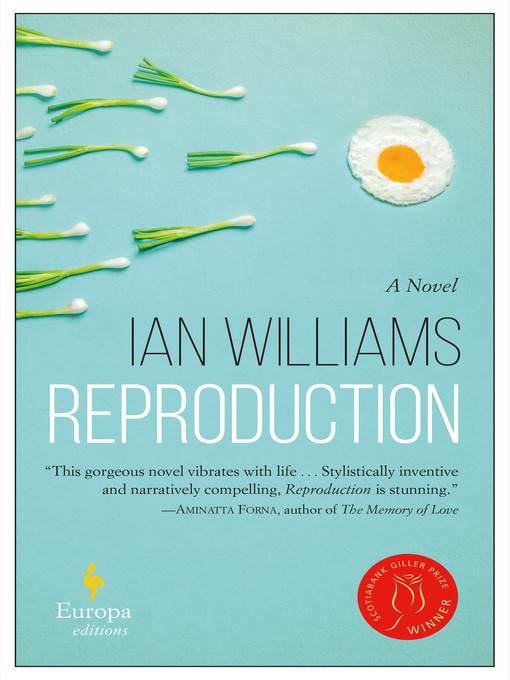
Reproduction
A Novel
کتاب های مرتبط
- اطلاعات
- نقد و بررسی
- دیدگاه کاربران
نقد و بررسی

January 6, 2020
Williams’s inventive, Giller-winning debut novel (after the collection Not Anyone’s Anything) explores the roots of Canada’s home care program for migrants. In the late 1970s, Felicia Shaw, 19, and her mother live in Brampton, Ontario, having recently arrived from a “small unrecognized island” in the West Indies. Her mother suffers from a heart condition and winds up in a hospital in Toronto. Felicia forms an unlikely bond with middle-aged Edgar Gross, whose mother shares her mother’s hospital room. After Felicia’s mother dies, Edgar persuades her to move in with him, and their uneasy relationship is further complicated after Edgar gets Felicia pregnant and kicks her out of the house. Williams jumps through the years in short, indelible bursts of dialogue between Felicia and her son, Armistice (“Army”), and in chapters titled “XX” or “XY” after the sex chromosomes. At 14, Army develops a crush on his landlord’s teenaged daughter, Heather. After Heather becomes pregnant, she confides to Army that she was raped, while Felicia compares Heather’s plight to her own experience of teen pregnancy and hopes Army will break from the cycle. While the dizzying shuffle of voices and complicated structure occasionally overtax the reader, Williams’s unsparing view on the past’s repetition is heartrending. This ambitious experiment yields worthwhile results.

February 15, 2020
A generation-spanning debut novel of unintended pregnancies and imperfect chosen families, winner of the 2019 Scotiabank Giller Prize, by a black Canadian writer. In the late 1970s, two people meet in a Toronto hospital, where their dying mothers share the same room. That seems to be as far as their similarities extend: Edgar Gross is a wealthy, early-middle-aged white German man who works for his family's company, while Felicia Shaw is a 19-year-old black high school student originally from a "small unrecognized island." Felicia's mother dies and Edgar's is eventually discharged, but the two strike up a romance that is by turns affectionately teasing and rancorous. But soon Felicia finds out Edgar is married and then that she's pregnant; Edgar tries to force her to have an abortion, and Felicia moves out. A decade and a half later, Felicia and her 15-year-old son, Army, live in part of a house shared by their landlord, Oliver, and his two children. In alternating sections, Williams (Personals, 2012, etc.) roves among the perspectives of the people living at 55 Newcourt-- Felicia, drawn in yet again by Edgar, who's facing allegations of sexual harassment at his company; Army, who lusts after Oliver's 16-year-old daughter, Heather, and concocts various get-rich-quick schemes that rely mostly on his peers' money; Oliver, who can't stop thinking about his recent, acrimonious divorce; and Heather, who flirts with Army and a skinny shelf stocker at the local mall. But when Heather is raped and becomes pregnant, the residents of 55 Newcourt band together to take care of her. The novel contains a sly but sharp critique of power, in which women are forced to shoulder the failings, large and small, of white men--"[Edgar] stood in the doorway of the living room, calling for Felicia, whining the last syllable, waiting, as if he had forgotten how to take off his coat"--whose internal monologues are self-absorbed and un-self-consciously racist: "Her people killed each other as punctuation," Edgar thinks of Felicia. But what pulls the reader along are Williams' playful, brilliant formal innovations: song lyrics annotated from Heather's point of view, a bravura section organized in the form of a numbered list that cycles through each character's stream-of-consciousness and humanizes everyone involved. The last section, by contrast, drags as it attempts to tie together the novel's themes into a neat yet unsatisfying bow. A witty, formally thrilling family saga that feels about 100 pages too long.
COPYRIGHT(2020) Kirkus Reviews, ALL RIGHTS RESERVED.

Starred review from April 1, 2020
DEBUT Felicia, a 19-year old from "a small unrecognized island" in the Caribbean, discovers Edgar, an older German businessman, in the hospital room to which both of their ailing elderly mothers have been assigned. What transpires from this fateful meeting is a lifetime of connections, multiple misunderstandings, and a child. Add to the mix Felicia's landlord, Oliver, and his children, and this novel by Canadian poet Williams becomes a sprawling family history. Says Army, Felicia and Edgar's son, "People fall into other people's arms, you know." As in Jonathan Franzen's The Corrections and Ann Patchett's Commonwealth, the family narrative allows Williams to dig deeply into the culture and events of the time--in this case, Brampton, Ontario, from the late 1970s to the early 2000s. Winner of the Scotiabank Giller Award for this work, Williams creatively and masterfully intersperses poetry, dialog, humor, pregnant asides, music lyrics, and descriptive passages to reveal what is going on inside the characters' heads and outside in the world around them. VERDICT There is a breathless quality to the novel, and at times Williams appears to take on too much. Nevertheless, this work successfully examines major themes of empathy, responsibility, secrecy, race, multiculturalism, misogyny, and honesty.--Jacqueline Snider, Toronto
Copyright 2020 Library Journal, LLC Used with permission.

























دیدگاه کاربران